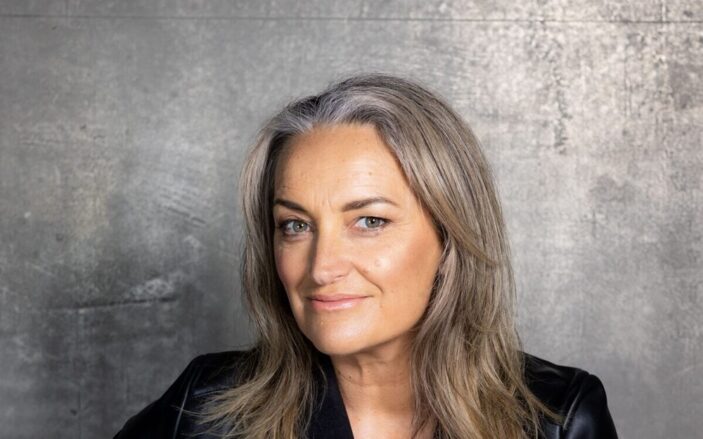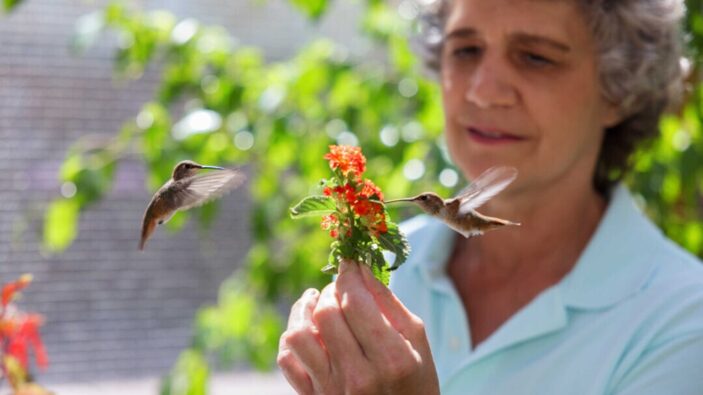
Every Little Thing follows retired writer and teacher Terry Masear over a summer as she takes in and rehabilitates injured hummingbirds. Shot with stunning close-ups of the birds against the backdrop of Masear’s storied life, this film is a mediation on human-animal relationships and our capacity for care.
Bringing this stunning story to the screen is celebrated Australian documentarian Sally Aitken, who has covered a wide range of unique subjects across her career, from shark training (Playing with Sharks), legendary Australian film critic David Stratton (David Stratton: A Cinematic Life), and, most recently, The Wiggles (Prime Video’s Hot Potato).
As Every Little Thing arrives in Australian theatres, our Peter Gray spoke with Aitken about if she’s noticed a different audience reception between festival goers and the general public, what she learnt about herself in the film’s wake, and how the recent Los Angeles fires altered its importance.
I know Every Little Thing premiered at Sundance last year, do you find festival audiences react differently? Almost like it’s more organic, because they aren’t swayed by outside opinion…
This is a great question. I have really no idea. I mean, I’ve found with this film, the audiences just love it. And what’s been really interesting is you think, “Oh yeah, Sundance is the film crowd. They might like the craft.” And then we were lucky enough to get invited to SXSW, and I thought maybe in Texas they like hummingbirds (laughs). Then it played in Copenhagen in this super arthouse festival, and they all loved it as well. So, interestingly enough, at Sundance, they do the festival screenings, but they always have a regular screening with quote unquote “regular people” (laughs), and that was sold out (for us). The audience loved it.
So I don’t really know that there’s a difference. Clearly, there are different audiences, but it seems to be playing well, irrespective of whether you like birds, whether you like stories cinematically told or you’re looking for something about the natural world, or, I don’t know, the next film from the woman who directed the Wiggles documentary (laughs).
I will say just briefly on that, (Hot Potato) was such an amazing documentary. The Wiggles was never of my time, but such a cultural phenomenon. It was really quite inspiring and heartbreaking at the same time.
That’s so good to hear. When I started that project, I was the same. I wasn’t a baked-in Wiggles fan, they were before my time. And even though I’ve had kids, I hadn’t had my kids in Australia at that time, but by the end of the process, I had drunk the Kool-Aid (laughs). To me, it’s their radical optimism and their absolute authenticity to who they are and what they do. And I was so moved by that. It was really interesting.
We will return to Every Little Thing (laughs), although Amazon would be really happy we were talking about this (laughs). So, I had a film three years previously at Sundance called Playing with Sharks, which is the story of Valerie Taylor, the pioneering scuba diver who literally played with sharks. She’s turning 90 this year. She’s a rock star. Anyways, at these screenings they have moderators, and they’ll stand up and say nice things about your film. Typically, they’ll say things about me and how I had this beautiful film called Playing with Sharks, another film about a woman in the natural world. I’d be asked “Where do you find these extraordinary stories of women in the natural world?” And I’d be like, “I do have to say, I make films about everything. I make films about true crime. Fun fact, I made a film about The Wiggles.” It was quite hilarious to see American audiences react. It was like a fun litmus test to see how globally recognized they are. They’re such a juggernaut.
Just incredible. But we should probably talk about Every Little Thing. You’ve got the intimacy of Terry’s journey, and then you’ve got the broader ecological implications. Is there an approach for you to balance that delicately? So that you’re not favouring one element over the other?
I think you absolutely nailed it when you say it’s a delicate balance, and part of that is the mere fact that we are talking about these very diminutive creatures. And one of the things I remember talking about with Tania Nehme, who’s the brilliant editor of Every Little Thing, and it was our task going into the edit to make the smallest things feel absolutely huge. It was kind of affirming and delightful to read, and I can’t remember which review it was, about when the hummingbird takes its one inch hop from the stick to the perch, and it was likened to a Marvel movie (laughs).
And, at least for that reviewer, we achieved it. I do think audiences will come to this film and they’ll learn about hummingbirds, you’ll see them in flight, and you’ll hear about their troubles. But, if you’re open to it, the film is an incredible invitation to so much more than that. It’s so rich with these deeply philosophical ideas about how we relate to the natural world, how we move through our own lives, and how we can be both beset with trauma and resilient in the face of it. These are very grand cinematic themes. It just so happens that the heroes here are these tiny, beautiful, magical creatures.

And looking at the interconnectedness of everything, as you were filming, was there anything that surprised you and took on a much bigger shape within the story that you weren’t expecting?
I think the biggest surprise was that when I embarked on this shoot, and I’d read Terry’s memoir, I’d been really inspired by the idea of these tiny birds against this massive city. I thought it was such a juxtaposition. What I didn’t know going into it was anything about Terry’s personal story. And what so often happens in these sorts of films, you develop these special relationships. Everyone becomes very intimate with each other as you film over long periods of time. There’s an intensity to them, and especially with documentaries, you all sign up for this adventure because you don’t have a script at the outset. You just have a set of ideas.
As a film itself, it feels even more important in the wake of everything that happened in Los Angeles. It’s added this whole other layer. You were already telling this important story about the unpredictability of nature. Has it brought a new perspective to the film at all?
I think that’s a great question. I think in some ways, as you said, Peter, the fires crystallized some of the themes in the film. I certainly think this idea that we are all interconnected with nature, and yet nature is so unpredictable, just like life, and that we fragile in the face of that, just like a tiny hummingbird against a wind storm, or a cat, or whatever, but that we are also resilient and that we are able to find our way through these things, and sometimes we can’t. It’s about the compassion going in rather than the outcome.
There’s such hope in that message. The film opened in cinemas in the US, and it started in New York and then was due to open in LA on the same week as the fires. We weren’t sure if we should go ahead. Aside from any argument around, “Oh, well, Los Angeles is a city built on entertainment, and if your personal health is fine, then, of course, the wheels of the machine need to keep (turning.)” Forget that argument. Even if it’s valid. What we were told by some people who really championed this film, was that the city is grieving, and us as Australians, we know that feeling so intensely, and they said how this film is actually a gift.
I don’t know if the film has been helped, but I certainly think that there are very powerful resonances that made the screenings in LA very emotionally charged. Like, the number of people who were flat out crying was pretty amazing, and it is stunning to see those gorgeous green hills in the film, knowing what we have been shown in terms of the devastated landscapes after the fires. I think we are in a moment in the world where, not just the fires, but the political landscape and the existential threats of AI, and all these things we live with on a daily basis, we never see the stories that are good. I don’t mean Pollyanna, but we are capable of so much more humanity and so much compassion and empathy, and we never see those stories.
And for you personally as a filmmaker and storyteller, I imagine with every film you learn more about yourself, not just the subject at hand. Was there anything on Every Little Thing that forwarded you as a person or filmmaker, or even both?
Oh, totally. Every film, but especially this one, I think what was so beautiful is that the algorithms did not make this film. On a craft level, it was incredible to feel like we were creating this delicately balanced visual poem that is funny and informative, but the aspiration of that can nearly break you. Like, how the hell am I going to make a film about one woman and a bunch of birds? So, to have people say (the film) moved them or to be thanked for this gift because it reminded them of their grandmother…the point about the film was to make an invitation to these bigger ideas. So the fact that people have told me all kids of things, and Terry, too, it’s been amazing. I think it’s taught me that it’s just a total underscoring of what I believe in that you can tell the stories of the smallest thing and they can have the biggest impact. I just want to keep making surprising stories. That’s my thing. I really love taking something that people think they might know, like The Wiggles, or sharks or hummingbirds, and saying how, you know, you can actually train a shark, or that hummingbirds are spiritual. That’s my jam. And I’m very emotional about it.
Every Little Thing is now screening in Australian theatres.
